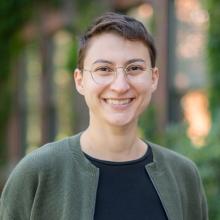Why did you decide to choose developmental science as a course of study or career?
My interest in settings and contexts drew me to developmental science. Developmental Science is a big tent that provides the opportunity to conduct applied work to support youth and their communities while remaining grounded in rigorous research. It's the best of both the basic and applied science worlds!
Is there a mentor or mentors who have been instrumental to your studies and career path so far, and, if so, who and how?
I have had the privilege of working with truly wonderful mentors. My dissertation chair, Erin Godfrey, introduced me to the developmental field of critical consciousness, and was tirelessly supportive, constructive, and patient with my insistence on integrating this research with my other interests in intergroup relations and queer youth. Hiro Yoshikawa, Paul Poteat, Jerel Calzo, and Ryan Watson welcomed me into the world of sexual and gender minority (SGM) research, and have been immensely generous in supporting my expanding research interests in this area.
What advice would you give to a prospective graduate student thinking about beginning their Ph.D. studies in the developmental science field?
Don't be afraid of anything! You are good enough, your research matters, and rejection is a necessary part of success in any academic field. Keep asking questions you care about, and seek out mentors who will support you to do so.
What is your best SRCD memory?
The SRCD Construction of the 'Other' Special Topic Meeting in Puerto Rico in 2022 was amazing. There were so many relevant and important research presentations on prejudice and discrimination, followed by the chance to process, discuss, and socialize on the beach with members of the SOGIE Caucus.
Why did you join the SOGIE Caucus and how does it facilitate connection among members all year long?
Positive peer pressure. During an SRA meeting, all my friends were leaving for drinks at the same time. I asked where they were going, and they invited me to the SOGIE Caucus meeting. I was nervous to attend because only a small portion of my research focuses on SGM youth, but everyone was so welcoming that I kept coming back. The SOGIE Caucus is a great way to meet potential collaborators, and is always supportive; the Caucus provided an important network to recruit and advertise when I co-chaired a preconference on SGM research at SRA last year. It's great to have that friendly "home base" to connect with at conferences.
